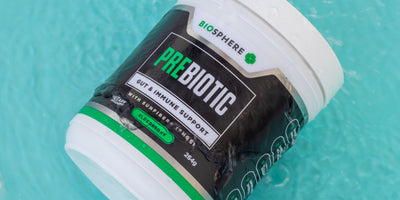
Ageing Gracefully: How Prebiotics Contribute to Healthy Ageing
Ageing gracefully is a nuanced, multifaceted journey involving the amalgamation of various health aspects, including dietary choices. The incorporation of prebiotics can have a significant impact on healthy ageing, considering their role in maintaining gut health and their subsequent effects on overall well-being.
The Gut Microbiota and Ageing
Ageing inevitably brings about changes in the gut microbiota, often leading to a reduction in its diversity. Prebiotics, non-digestible fibres, play a crucial role in nurturing beneficial bacteria, maintaining a healthy gut environment, and fostering a balanced microbiota. They combat the imbalances associated with ageing, promoting the growth and functionality of beneficial bacteria in the gut.
The equilibrium maintained by prebiotics can be crucial in supporting the gut’s role in immunity and metabolism. It’s essential to adopt a balanced lifestyle and dietary habits, complemented by optimal prebiotic intake, to maintain a harmonious gut microbiota. This balance is pivotal in preventing gastrointestinal issues and supporting overall well-being in the ageing process.
However, achieving and maintaining this balance is challenging, especially considering the variations in individual dietary preferences, medical histories, and lifestyles. Thus, a personalised approach to prebiotic intake and lifestyle modifications is essential to realise the full potential of prebiotics in maintaining gut microbiota and supporting healthy ageing.
Immune System Vitality
Ageing brings about a gradual decline in immune functionality, making the elderly more susceptible to infections and diseases. The interaction between prebiotics and the gut environment has a significant impact on immune health. By fostering beneficial bacteria and reducing inflammation in the gut, prebiotics can support the immune system’s vitality and help maintain the body’s natural defence mechanisms.
Adopting a diet rich in prebiotics, combined with other lifestyle modifications, is crucial for maximising the immune-boosting benefits of prebiotics. The synergistic relationship between prebiotics and immunity helps in preventing age-associated diseases and contributes to the overall well-being and longevity of ageing individuals.
However, the effectiveness of prebiotics is not uniform and may vary based on individual health conditions, dietary habits, and lifestyle. Therefore, a personalised approach, considering individual needs and conditions, is crucial for achieving optimal immune benefits from prebiotic intake.
Cognitive Health and Prebiotics

Cognitive health is intricately connected to gut health through the gut-brain axis. Prebiotics influence cognitive health by modulating gut microbiota, reducing inflammation, and maintaining the integrity of the gut-brain axis. This is crucial in preventing cognitive decline and neurodegenerative conditions that are often associated with ageing.
The role of prebiotics in neurotransmitter production and reduction of neuroinflammation offers promising paths for cognitive health maintenance. By aiding in maintaining a balanced gut environment, prebiotics contribute to the overall well-being and mental health of ageing individuals.
However, the complexity of the interactions between the gut and the brain necessitates more comprehensive research to understand the full impact of prebiotics on cognitive health. It’s pivotal to develop refined interventions and adopt a balanced approach to diet and lifestyle to optimise the cognitive benefits offered by prebiotics.
Prebiotics and Bone Health
Bone health is a critical aspect of ageing, with ageing leading to a decrease in bone mineral density and an increased risk of fractures. Prebiotics enhance the absorption of essential minerals like calcium, which is fundamental in maintaining bone mass and preventing bone-related conditions in ageing individuals.
The combination of prebiotics with a balanced diet rich in calcium and vitamin D, along with weight-bearing exercises, can offer comprehensive benefits to bone health. This holistic approach is essential for preventing osteoporosis and other bone-related conditions commonly associated with ageing.
However, individual differences in dietary preferences, medical conditions, and lifestyle necessitate a personalised approach to optimise the bone health benefits of prebiotics. A well-rounded approach to bone health includes consideration of individual nutritional needs, lifestyle choices, and medical conditions.
Reducing Age-Related Inflammation
Chronic inflammation is a key contributor to various age-related diseases. Prebiotics can modulate gut microbiota to foster a balanced environment, reducing inflammation by enhancing gut barrier function and fostering beneficial bacteria. This is crucial for preventing inflammatory conditions and supporting overall well-being during ageing.
Incorporating a balanced diet rich in prebiotics, along with regular exercise, adequate sleep, and stress reduction, can offer comprehensive anti-inflammatory benefits. This multi-faceted approach is essential for managing inflammation effectively and maintaining overall health in the ageing process.
Nonetheless, the effectiveness of prebiotics can vary based on individual health conditions and lifestyles. A personalised, balanced approach to prebiotic intake is essential to maximise anti-inflammatory benefits and support overall well-being in the ageing process.
Digestive Comfort in Ageing
Digestive comfort is crucial as ageing can bring about changes in digestive function and gut microbiota, leading to increased digestive discomfort. A balanced intake of prebiotics is fundamental in maintaining optimal gastrointestinal function and reducing the risk of digestive issues common in ageing individuals.
Prebiotics contribute to digestive comfort by fostering a balanced and diverse gut microbiota, preventing the overgrowth of pathogenic bacteria. It is crucial for individuals to consider their dietary preferences and tolerances to ensure digestive comfort and avoid gastrointestinal discomfort associated with ageing.
The approach to maintaining digestive comfort with ageing involves not only a focus on prebiotic intake but also a balanced and thoughtful consideration of individual dietary needs, preferences, and medical conditions. This ensures the effectiveness of prebiotics in maintaining digestive health and comfort in ageing individuals.
Cardiovascular Health Support
Cardiovascular health is of paramount importance in ageing, with cardiovascular diseases being a leading cause of death worldwide. Prebiotics can modulate blood lipid levels, reduce inflammation, and maintain endothelial health, thereby supporting cardiovascular health in ageing individuals.
Combining prebiotics with a heart-healthy lifestyle including regular exercise and a balanced diet can offer optimal cardiovascular benefits. The modulation of gut microbiota by prebiotics contributes significantly to maintaining a heart-healthy environment and reducing the risks associated with cardiovascular conditions.
However, individual differences in health conditions, lifestyles, and dietary preferences necessitate a tailored approach to realise the full potential of prebiotics in supporting cardiovascular health. A balanced approach involving lifestyle modifications and optimal prebiotic intake is essential to maintain cardiovascular health in ageing individuals.
Maintaining Muscle Mass
Ageing is associated with the decline of muscle mass and strength, impacting mobility and quality of life. Prebiotics, by maintaining a healthy gut environment and reducing inflammation, can indirectly support metabolic functions essential for maintaining muscle mass and strength.
A multifaceted approach involving regular physical activity, balanced diet rich in protein, and prebiotic intake is essential to maintain muscle mass in ageing individuals. This approach is critical in ensuring mobility and reducing the risk of falls and fractures commonly associated with ageing.
Individual variations in health conditions and lifestyles make it crucial to adopt a personalised approach to diet and lifestyle modifications to optimise the benefits of prebiotics in maintaining muscle mass. This is fundamental for overall well-being and quality of life in ageing individuals.
Healthy Skin and Prebiotics
The skin experiences significant changes with ageing, affecting its elasticity, moisture levels, and overall appearance. Prebiotics can support skin health by maintaining a balanced gut microbiota and reducing inflammation, which are integral for maintaining healthy skin.
A comprehensive skincare routine including the application and intake of prebiotics, proper hydration, and a balanced diet, can contribute significantly to maintaining skin health and vitality. By focusing on internal health through prebiotics and adopting external skincare practices, ageing individuals can combat age-related skin issues such as wrinkles, dryness, and loss of elasticity effectively.
The anti-inflammatory properties of prebiotics play a pivotal role in maintaining skin health by reducing inflammation, which can contribute to various skin conditions such as acne, eczema, and psoriasis. The balance prebiotics bring to the gut microbiota reflects on the skin, maintaining its health and youthful appearance.
However, the individual’s skin type, medical conditions, lifestyle, and dietary habits necessitate a tailored approach to skincare. It is essential to align prebiotic intake with other skincare routines and lifestyle modifications to fully harness the benefits of prebiotics for skin health, keeping in mind that an imbalance may lead to skin disruptions and other health-related complications.
Summary
The Gut Microbiota and Ageing- Ageing alters gut microbiota, reducing its diversity.
- Prebiotics nurture beneficial bacteria, ensuring gut health and balanced microbiota.
- Ageing can weaken immune functionality and increase susceptibility to diseases.
- Prebiotics enhance immune health by fostering beneficial bacteria and reducing inflammation.
- Cognitive health is linked to gut health via the gut-brain axis.
- Prebiotics aid neurotransmitter production and reduce neuroinflammation, contributing to mental health.
- Ageing impacts bone health, reducing bone mineral density and increasing fracture risks.
- Prebiotics enhance the absorption of essential minerals like calcium, crucial for maintaining bone mass.
- Chronic inflammation is a significant factor in numerous age-related diseases.
- Prebiotics modulate gut microbiota to reduce inflammation by enhancing gut barrier function.
- Ageing can alter digestive function and gut microbiota, increasing digestive discomfort.
- Prebiotics maintain optimal gastrointestinal function and reduce the risk of digestive issues.
- Cardiovascular health is crucial in ageing, and prebiotics can modulate blood lipid levels.
- A heart-healthy lifestyle, including exercise and a balanced diet, can offer optimal cardiovascular benefits.
- Ageing is associated with a decline in muscle mass and strength.
- Prebiotics, by maintaining a healthy gut, can indirectly support metabolic functions essential for maintaining muscle mass.
- Ageing affects skin health, impacting its elasticity and moisture levels.
- Prebiotics support skin health by maintaining balanced gut microbiota and reducing inflammation.
Prebiotic Information
For everything you need to know about prebiotics and prebiotic supplements, check out our comprehensive information page here.
Prebiotic
Biosphere Nutrition’s Prebiotic Powder is a unique blend of Sunfiber® and Black Elderberry Extract, designed to nurture gut health and support the immune system. This easy-to-mix, great-tasting formula ensures optimal absorption and digestive comfort. To learn more about our Prebiotic, check out the product page here.









